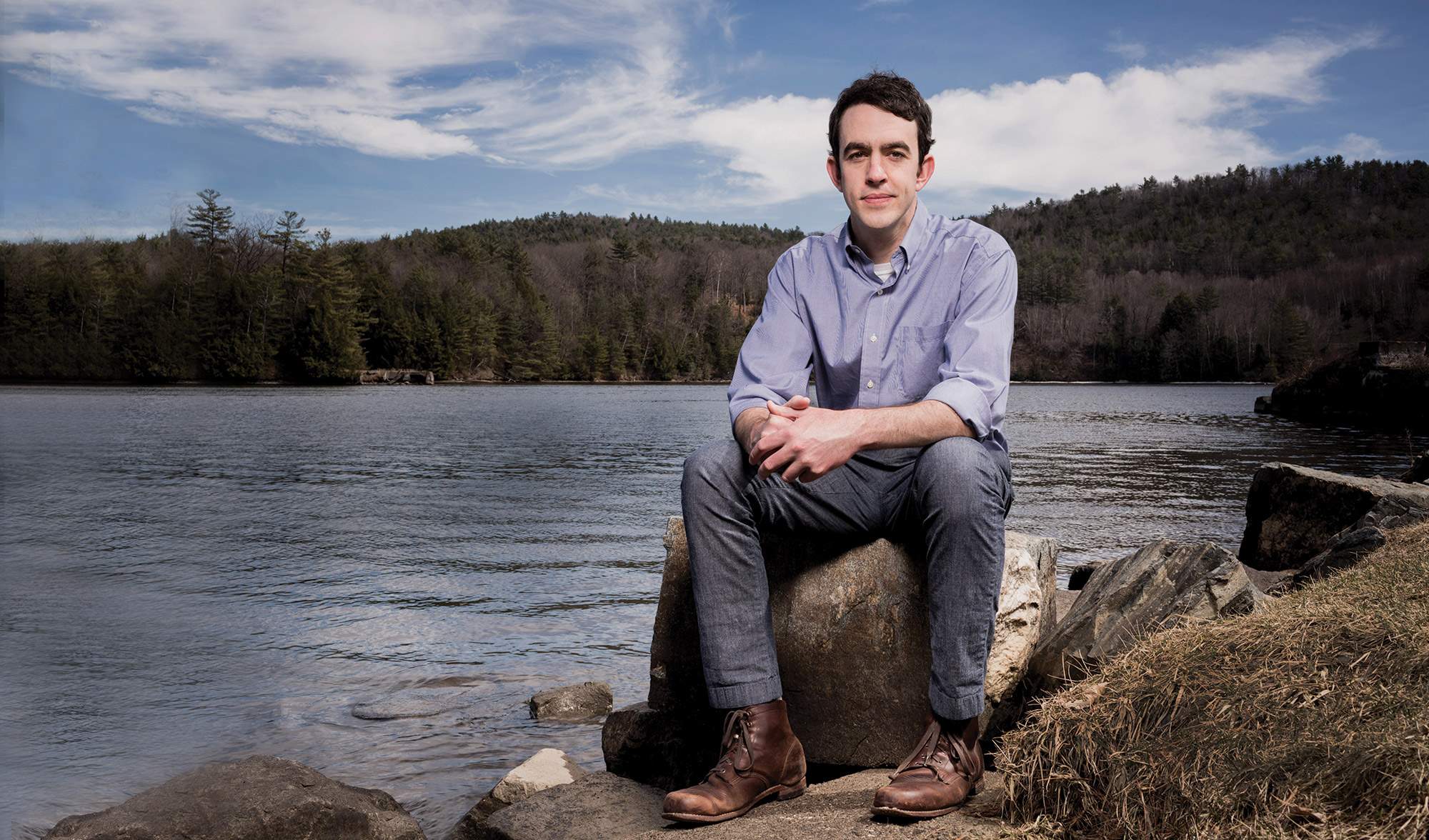
Coming Home
An experiential journey to the heart of Mississippi.
By Jeff Moag
Aug 08, 2017

Tom Allin didn’t realize how much a part of him Mississippi was until he left home.
Tom Allin didn’t realize how much a part of him Mississippi was until he left home. As one of the few (if not the only) Mississippians in his class at the University of North Carolina, he became a proud and popular ambassador of his home state. He fielded frequent questions about the state, and whatever form they took their substance followed a common theme: What is wrong with Mississippi?
Over time, Allin began to ask himself a related question: What can I do to help?
He wrote his senior thesis at UNC on the experiences of Mississippi expatriates and after graduation returned to the state with Teach for America (TFA). He worked in the Delta, a swath of northwestern Mississippi best known for its economic challenges and a form of musical lament called the blues. Allin, who is white, ran a school drama program focused on black history for public school students who were almost all African American and came from underprivileged backgrounds.
“That experience taught me just how little I knew about Mississippi,” says Allin, a slender 30-year-old with an earnest demeanor and easy smile. “It was a pretty important realization that there was so much left to know and so much left to explore about the place I called home.” He spent two years in the Delta with TFA before going to work with an ad agency in his hometown of Jackson. Part of his job there was to improve Mississippi’s image outside the state, a role to which he seems genetically predisposed. His Delta experience had left him feeling more deeply rooted than ever in Mississippi, and he was determined to contribute to the state in a more substantive way. Part of that plan involved pursuing his MBA at Tuck.
That experience taught me just how little I knew about Mississippi. It was a pretty important realization that there was so much left to know and so much left to explore about the place I called home.
Allin began laying the groundwork for what would become the Mississippi Global Insight Expedition (GIX) before his first-year classes even started. “I remember very clearly sitting with Sally Jaeger out in front of Tuck Hall on a beautiful fall day, saying ‘I have this idea,’” he says. While it’s not unusual for Tuck students to pitch exchange courses focused on their home country or region, not all come to fruition. Allin made his case with quiet persistence and an enthusiasm that set him apart.
“It’s hard to be at Tuck and not know Tom,” says Courtney Miller T’17. “And if you know Tom you know he’s from Mississippi.”
Allin says he loves telling people about the state, and admits that friends jokingly call him The Governor. “I love the state’s historical significance, and the contributions it’s made to our nation’s culture,” says Allin. “To have a single place be the home of B.B. King, Robert Johnson, Muddy Waters, Eudora Welty, Tennessee Williams, Elvis Presley, is just astonishing.”
When he arrived at Tuck, he was thrilled to find his classmates genuinely curious about his home state. The idea of a Mississippi GIX became an ongoing conversation with faculty and administrators.
“To Tuck’s credit, nobody ever told me no,” he says. “Nobody said yes right away either, but nobody said no.”
The turning point came in a conversation with Tuck professors Emily J. Blanchard, who specializes in global economics, and Andrew A. King, who teaches strategy.
Recalls King, “Tom walked into my office and said ‘I think we should run a trip to Mississippi. It’s got a distinctive economy and it's a distinctive region of the United States and it could be a valuable experience for students.’” King, who believes his biggest impact has been as a mentor and adviser, immediately asked Allin what he could do to help. Other than a green light for the course, Allin didn’t need much assistance. “If I said Tom did 90 percent of the work I’d be giving at least myself too much credit,” King says.
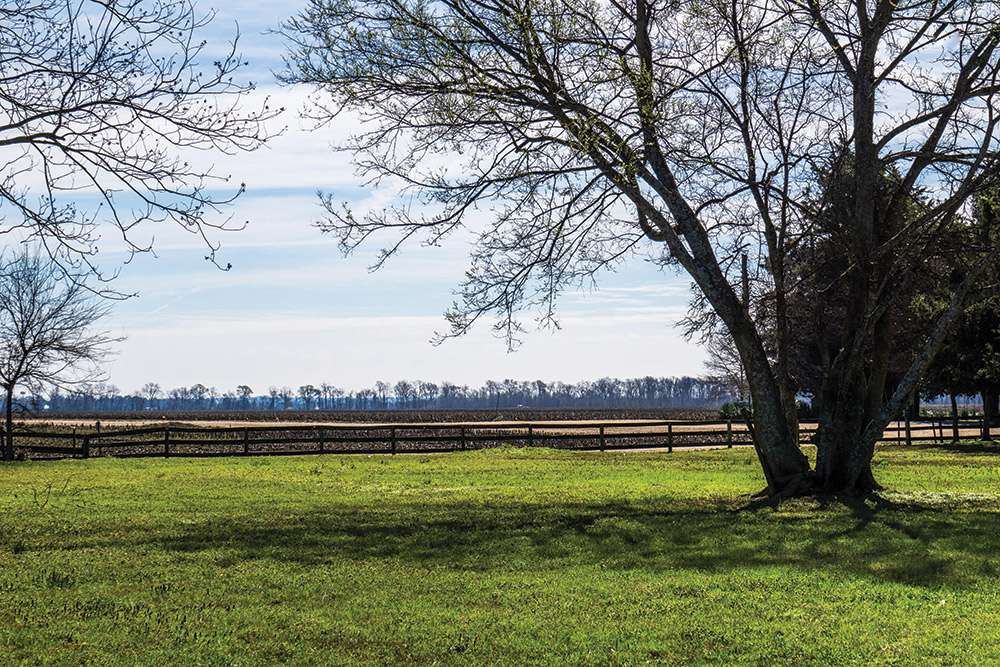
Allin and King then drafted Blanchard, who remembers being struck by Tom’s energy, passion, and demonstrated commitment. “Tom showed up at our first meeting with a draft itinerary and a set of deep questions about how to think about Mississippi’s economic development.” The ideas and the setting were too important to pass up. “Tom’s vision for the Mississippi GIX embodies the heart of Tuck’s wide-lens approach to understanding business. I was honored to play a part.”
Once professors Blanchard and King signed onto the project, Tom was able to recruit TuckGO and the Tuck Center for Business, Government & Society to handle the operations and funding. With Blanchard and King guiding the academic component, Allin poured himself into the project, using his network and knowledge of the state to craft an itinerary that would foster a deep understanding of Mississippi’s complex history and unique challenges. He spent nearly a year organizing visits to manufacturing facilities, farms, and retailers in every region of the state. He arranged meetings with Mississippi’s governor Phil Bryant, philanthropist Jim Barksdale, and a broad cross-section of educators and entrepreneurs working to change the state from within.
Allin and the professors designed the course to shed light on how regional economic development relates to an area’s unique history, geography, resources, and institutions. That the Mississippi GIX took place in the U.S. heartland is particularly meaningful. While we often think about economic development on a national level, enormous variation exists within countries. In the United States, Mississippi is often held up as an example of social and economic under-performance.
On an early March morning, Allin and his wife Sarah, a graduate of Harvard’s Kennedy School who has worked in the state, welcomed the GIX group to Jackson. That first day the group met with members of the Mississippi Development Authority, who described an economic plan designed to attract large-scale manufacturing to the state. They also stopped at Two Sisters Kitchen in downtown Jackson for what Allin describes as “the best fried chicken in the world.” That evening Allin’s parents John and Betty hosted the group in their home.
The notion of Southern hospitality may be cliché, but course participants all remarked on the warm welcome they received from almost everyone they met in Mississippi. Allin confesses to feeling like a harried host, introducing his professors and classmates to some of the things he loves best about his home state. The itinerary he crafted, however, also pulled the curtain from Mississippi’s deepest problems.
Segregation remains a defining feature in many Mississippi schools, though the mechanism is no longer the law, but rather white families choosing to enroll their children in private schools. Through his Teach for America (TFA) network, Allin arranged to give the Tuck group an insider’s view of Mississippi’s stagnant public education system, as well as the surprising points of light within it. There were three such meetings during the course but the first, in the Delta town of Clarksdale, was particularly powerful.
The group of 20 Tuck students and two faculty sat in a semicircle with Allin and two accomplisjed educators, Sanford Johnson and Courtney Van Cleve, at one end. “To have two incredibly talented people who could really be anywhere in the world if they wanted to, both sharing their stories of why they chose to come back not only to Mississippi but to live in a town like Clarksdale—I think that made an impact,” says Allin. Johnson and Van Cleve are both from Mississippi and both chose to continue working as educators in Clarksdale after their TFA commitments ended.
“They’re both young, Sanford is black, and Courtney is a woman,” Allin says. “Up to that point we had met with a lot of older white males—which I, too, one day will be an older white male—but in some ways they represented a different face of leadership in the state.” In the meeting, Allin says, “they were able to acknowledge the state's great challenges but also do so with humor, humility, and a sense of resiliency, or grounded optimism.”
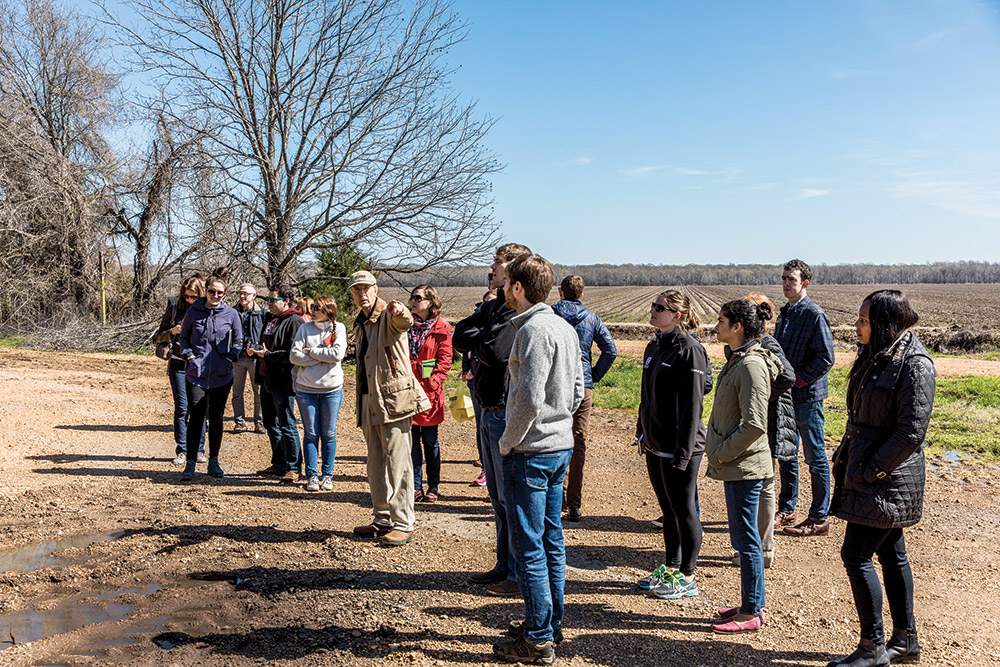
The Tuck team tours Egypt Plantation in the Mississippi Delta.
The group got another boost that afternoon when they met Steve Iwanski in Greenwood, Miss., where Viking Range employs about 1,000 people in its manufacturing plants. The objective was to discuss spillover effects from a company like Viking, whose founder and former CEO Fred Carl Jr., is a silent partner in Turnrow Book Co., the independent bookstore Iwanski runs in the heart of the Mississippi Delta.
The conversation turned to the Shakespeare program Iwanski organizes, in which students from Greenwood’s private and public schools worked together to design costumes, build a set, and perform a scene from Shakespeare’s work. For some of Iwanski’s students, this program offers the first opportunity for meaningful interaction with students of another race. The students now hang out together in the bookstore, and the program has a 100 percent return rate, says King.
“That’s pretty inspiring, and what you realize is, it’s people like Iwanski who are pulling these things together,” he says. “It’s not just him; there are a lot of great people trying to make a difference, so that’s when you are very hopeful. It’s a sort of low-level, grassroots effort of great people doing remarkable things.”
There are a lot of great people trying to make a difference, so that’s when you are very hopeful. It’s a sort of low-level, grassroots effort of great people doing remarkable things.
At times the GIX bus felt like a roller coaster, with the group’s mood swinging from inspiration to frustration and back again. The group had discovered Mississippi to be far more complex than any of them expected. Blanchard says that is a sign of a successful course. Lively conversations about difficult and nuanced challenges improved everyone’s understanding of Mississippi and the broader global economy, Blanchard says, including her own.
The state has been relentless in its efforts to attract manufacturing facilities, such as the Nissan assembly plant in Canton, Miss., which employs roughly 6,400 people. Lawmakers have provided large tax incentives, infrastructure support, and regulatory relief to attract industry to Mississippi, with some success. The state boasts excellent transportation corridors, unfettered access to the U.S. market, and some of the lowest labor costs in the United States. Given these factors, it’s perhaps surprising that Mississippi has not attracted more manufacturing.
“Mississippi’s development agencies have been relentless in their pursuit of major investments,” notes Blanchard, whose research includes the economics of foreign direct investment. While these efforts are often successful in attracting new firms, they’re not cheap. At least in the near term, tax incentives can come at the cost of school funding. “New jobs or new schools? The tradeoffs aren’t trivial.”
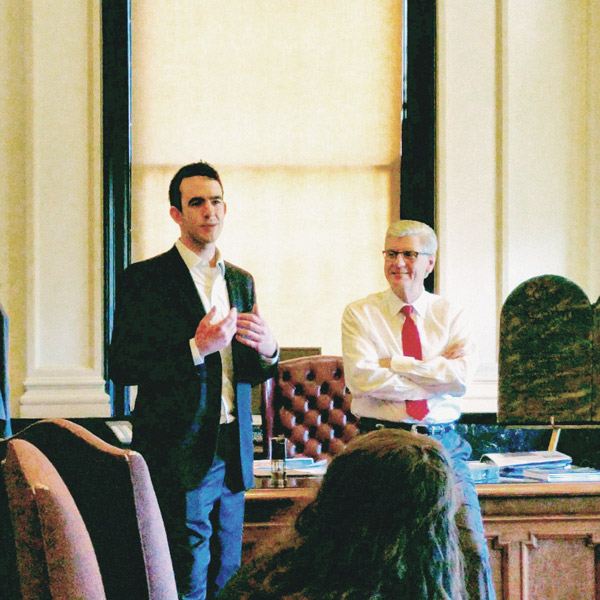
Tom Allin T'17 with Mississippi Governor Phil Bryant.
Public schools are chronically underfunded and because so many families have moved their children to private schools, educational funding initiatives are frequently voted down. While it’s true that labor costs are low in Mississippi, companies there still struggle to staff their factories with qualified people.
The state seems caught in an economic development Catch-22, trading away potential tax revenues to attract companies like Nissan and Airbus, and then being unable to make the investments in infrastructure and education required to sustain growth. But without those incentives, companies would simply locate their factories in areas offering attractive tax breaks of their own.
When is it worth it to spend tens or even hundreds of millions of dollars on attracting a manufacturing plant to the state? Economics research points to the potential for major investments to bring positive spillovers to the local economy, but in many parts of the State, these benefits have yet to materialize. “The Nissan facility is spectacular and it employs thousands of workers, but outside the plant, we saw few signs of renaissance in the local economy,” says Blanchard. Inside the Nissan building there’s a Chik-fil-A, a bank branch, and a medical clinic, but in nearby Canton there’s scant evidence of entrepreneurial businesses springing up to serve the needs of Nissan and its employees.
In a state where jobs in general are in short supply, and good jobs particularly so, companies like Nissan, Airbus, and the Ingalls Shipyard have their pick of potential employees. This leads to two related phenomena. First, these plants attract workers from all over the state and, particularly in the case of Ingalls which lies less than 10 miles from the Alabama line, neighboring states as well. The simple explanation is market-driven: people without good opportunity close to home will travel to get it. King sees another dimension as well. In Mississippi, more than in other parts of United States, people seem rooted to their home-places. In small rural communities across the state people are connected to their support networks, families, sense of community. It’s an intangible concept that is hard to measure, but on the ground in Mississippi it feels very real.
These threads seemed to come together at the Ingalls Shipyard during the group’s final day in Mississippi. The Tuck group toured the 800-acre facility, where the USS Delbert D. Black, a $1.8-billion Arleigh Burke-class destroyer, is rising through its scaffolding. Ingalls is a paragon of the large-scale manufacturing businesses the state has worked so hard to attract. Founded in 1938, Ingalls employed more than 27,000 workers at its peak in 1977. Today about 12,000 people work in the Gulf Coast shipyard, which anchors the local economy.
Like other businesses in Mississippi, Ingalls has struggled to find qualified workers. The shipyard’s solution has been to cultivate its own talent. The Tuck group was particularly impressed by Ingalls’ apprenticeship program. Their tour was led by a man who came up through the apprenticeship program, became a pipefitter, and went on to earn two degrees.
“Ingalls really seemed to have cornered the market on the workforce within that region,” says Courtney Miller T’17, who before coming to Tuck led a U.S. Army maintenance platoon. “We talk a lot about innovation as business school students, and some of the most remarkable innovation I’ve seen was by the mechanics I had in Afghanistan and Iraq when they were working to accomplish a mission. At Ingalls, it felt like the leadership is leveraging that same kind of innovation,” she says.
They must decide whether to pursue a career in the wider world and later bring their expertise home, or work within the smaller pond where they are more likely to make an impact right away.
In other words, the secret sauce at Ingalls combines the sort of large-scale manufacturing the Mississippi Development Authority is working to attract with the kind of grass-roots talent that is making a difference in the Clarksdale schools and Steve Iwanski’s Shakespeare program.
The subject of how to contribute had been the hot topic on the bus and over meals. For Eduardo Gonzalez T’17, that question became a deeper lesson of a course ostensibly focused on questions of labor, trade, and development. Gonzalez was born and raised in Puerto Rico, which like Mississippi is a part of the U.S. facing distinct and stubborn challenges. People like Gonzalez and Allin, who come from such places and have attractive opportunities elsewhere, face a kind of existential question at this time in their lives. They must decide whether to pursue a career in the wider world and later bring their expertise home, or work within the smaller pond where they are more likely to make an impact right away.
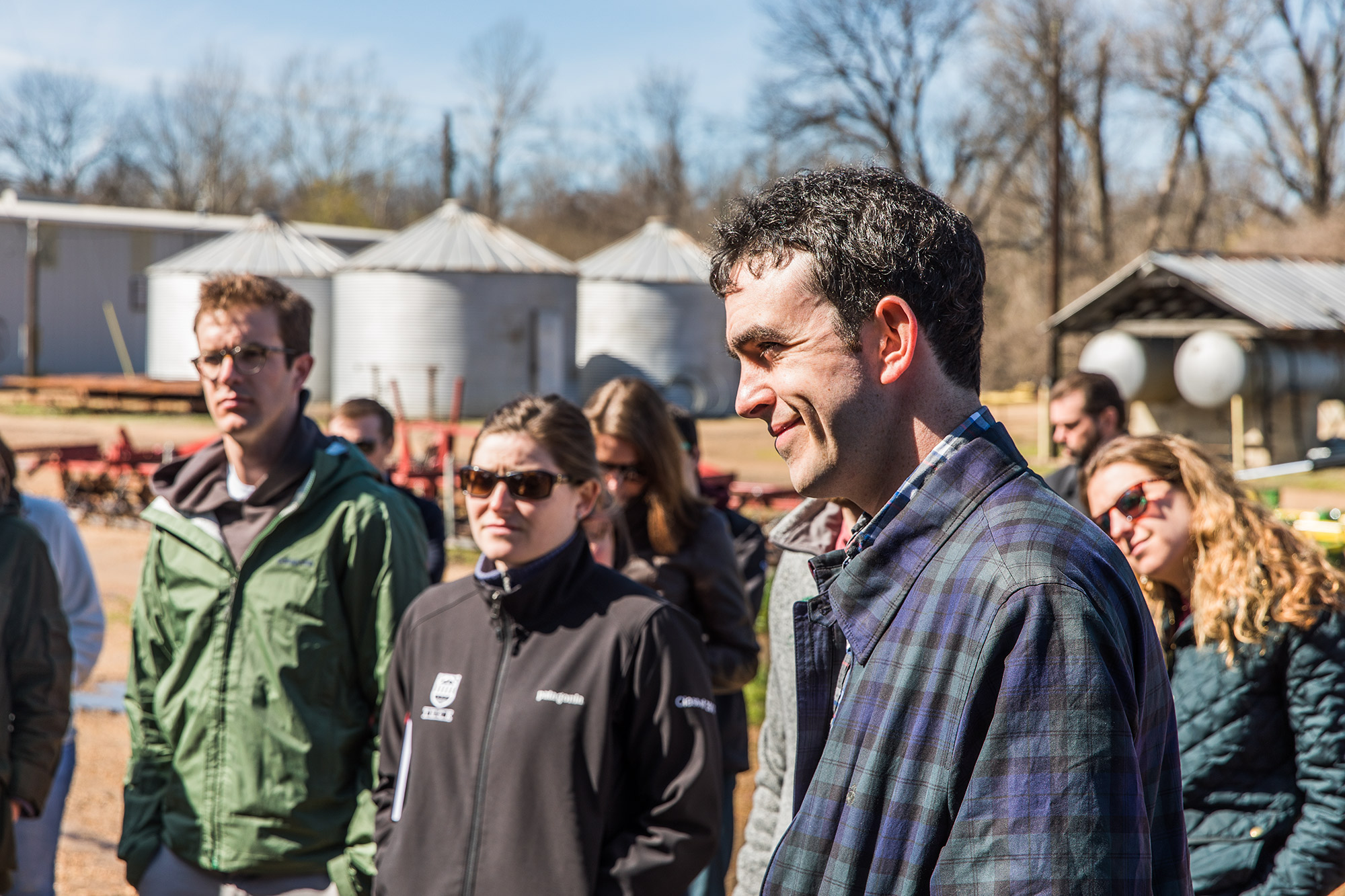
"You don't have to wait in line to make a contribution to this community," says Allin.
During the course, the group met with individuals who had chosen both paths. Jim Barksdale’s philanthropic efforts in Mississippi are only possible because he made his fortune at Netscape and FedEx. Johnson and Van Cleve are inspiring examples of the opposite approach. Connie Moran, energetic mayor of Ocean Springs Mississippi, has taken both paths during her career, first working as an economist in continental Europe before choosing to return home to Ocean Springs to serve in public office.
Allin has given a lot of thought to where he will settle after Tuck. For all the talk of an under-qualified workforce, Mississippi has produced its share of luminary talents, from William Faulkner to Jim Henson. FedEx founder Fred Smith hails from Mississippi, as does Oprah Winfrey. Other than Faulkner, all of them left the state.
Allin, who wrote about the Mississippi brain drain in his UNC thesis, doesn’t begrudge their decision to leave. He takes issue with the state’s inability to hold on to talented people. After graduation, most of Allin’s Tuck classmates will end up in one of five cities. Talented Mississippians like Johnson and Van Cleave pay a very real opportunity cost to stay close to home, he says, but they also have the chance to make an immediate difference.
“There’s just an opportunity to contribute. You don’t have to wait in line to make a contribution to this community. You might not be able to do that in a larger city or a larger state or a different country,” Allin says. He and his wife still marvel at the professional opportunities they had in Mississippi as new college graduates. “There’s no way that if we had gone to New York or D.C. or Atlanta that we would have been given the responsibilities and afforded the opportunities we had in Mississippi,” he says.
The answer to the question of how he can help came to Allin long ago. Sooner or later, he's coming home to Mississippi.
This article originally appeared in print in the summer 2017 issue of Tuck Today magazine.